|
Notes: The three mile long Alnmouth to Alnwick branch railway
was authorised by Act of Parliament granted to the Newcastle &
Berwick Railway on 31st July, 1845.
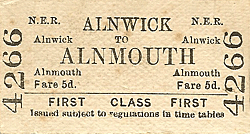 |
Construction didn't start however until the company has completed
its main line between Gateshead and Berwick and the branch was
eventually opened on the 5th August 1850. The original station
was on the outskirts of Alnwick adjacent to Shilbottle Coal Company
depot but this quickly proved inadequate and after requests from
the town council, the North |
Eastern Railway eventually agreed
to build a new station closer to the town centre which opened
on 5th September, 1887; a branch line from Alnwick to Cornhill
was opened on the same day.
The Alnwick branch was well used with 60 trains a day using the
station by the end of the century but by the 1920's passenger
numbers began to decline with the increase in car ownership. The
Cornhill branch was worst hit and the passenger service was withdrawn
in September 1930. The Alnwick branch remained open although the
service was reduced to 14 trains a day. By the mid 1960's passenger
traffic was still in decline and in an attempt to save money the
line was reduced to single track but the end was inevitable. Despite
considerable local opposition the passenger service was withdrawn
from 29th January 1968 with the goods service finishing the following
October.
| In 1975 the goods shed was carefully demolished and rebuilt at Beamish Museum in County Durham. The Station Master's house still stands as does
the impressive 1887 train shed. The wide island platform has been
demolished although an adjacent goods platform remains. In 1993
there was a proposal to redevelop the site as a supermarket but
this did not |
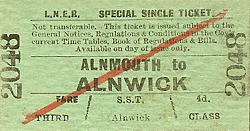 |
happen and a number of businesses now use the old
station building including Barter
Books, one of the largest second hand book shops in the country.
In 1995 The Aln
Valley Railway Society was formed to campaign for the restoration
of the train service between Alnmouth and Alnwick.
BRIEF HISTORY OF THE ALNWICK - CORNHILL BRANCH LINE
In 1881 there was a proposal to build a railway line from Rothbury to Wooler to be called the ‘Central Northumberland Railway’. This plan had the support of the North British Railway who were the North Eastern’s great rivals in Northumberland at the time.
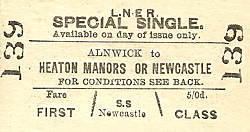 |
Following local objection from people in Alnwick who didn't want to see agricultural traffic from the Wooler area being diverted to the market town of Rothbury Alnwick traders, politicians and local land owners combined to put pressure on the North Eastern Railway to come up with a counter proposal. The N.E.R. proposed the ‘Cornhill Branch’running from |
their existing station at Alnwick through Wooler to a junction with the Tweedmouth to Kelso lined at Cornhill on Tweed.
Both proposals went before Parliament in 1881 but the Cornhill branch was by far the cheapest and an act was passed authorising the North Eastern Railway to build their 36 mile line from Alnwick to Cornhill; construction commenced the following year.
Alnwick station was lavishly rebuilt and to avoid the Duke of Northumberland's estate north of Alnwick The line initially headed south with the expensive diversion requiring a tunnel and a viaduct at Edlingham.
After some delays the line finally opened to good and mineral traffic between Coldstream and Wooperton 2nd May 1887 and throughout for all traffic on 5th September 1887. The line was single track throughout with passing loops at all stations; only Wooler Station had a second platform and Whittingham and island platform. Initially the line was well used but this was short lived and passenger services fell into decline after WW1 as the line was unable to compete with the new and more convenient bus services. Staffing levels were reduced, signal boxes closed and station masters were put in charge of more than one station but the line continued to lose money and an early decision was taken by the London & North Eastern Railway to withdraw passenger services. The final passenger train ran between Alnwick and Cornhill on 22nd September 1930, only 43 years after the line had opened
Despite losing its passenger trains the line remained open for freight mainly for local farmers, with regular goods trains. As a sideline the railway rented out disused waiting rooms and old carriages as self-catering holiday homes. These were known as ‘Camping Coaches’ and Cottages and they were a popular tourist
attraction on this and many other lines from the 30's |
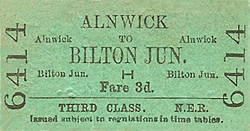 |
until the 60's .
During the Second World War the branch enjoyed a brief revival when Akeld station became the railhead for a new R.A.F. airfield at Milfield. After the war the airfield’s giant hangers were used for grain storage, and traffic to an from these helped keep the line open but the line's days were numbered.
The line suffered serious storm damage between Ilderton and Wooler in August 1948 with further storm damage the following year when as bridge north of Ilderton station was washed away. With such meagre traffic on the branch the newly formed British Railways could not justify the cost of replacing the bridge; instead the line became two lines; one from Alnwick to Ilderton, and the other from Coldstream to Wooler bur the service was infrequent, sometimes only one train a week.
The section from Alnwick to Ilderton eventually closed on 2nd March 1953. The Coldstream (Cornhill) to Wooler stretch survived a while longer before falling victim to the notorious Dr. Beeching’s railway cuts. It finally closed in March 1965, along with the Tweedmouth to Kelso line. Railway enthusiasts ran a special passenger train into Wooler shortly before the closure.
Other web sites:
Northumbrian Railways - The Cornhill Branch
Ilderton Station web site - includes a full history if the Alnwick - Cornhill line. Historical text taken from Ilderton Station web site. Tickets from Michael Stewart.
To see other stations on the Alnwick - Cornhill (Coldstream) line click on the station name: Alnwick, Edlingham, Whittingham, Glanton, Hedgeley, Wooperton, Ilderton, Wooler, Akeld, Kirknewton & Mindrum |

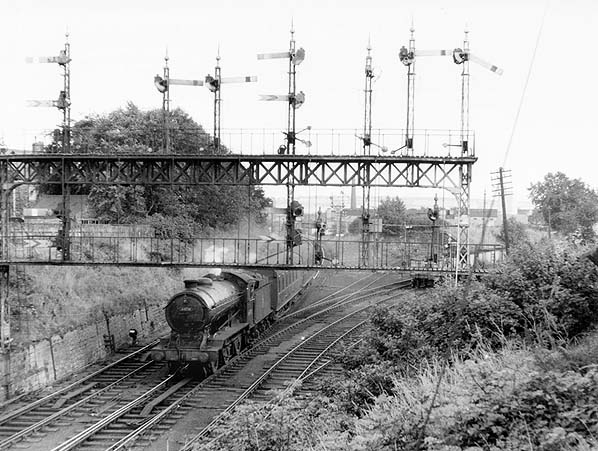
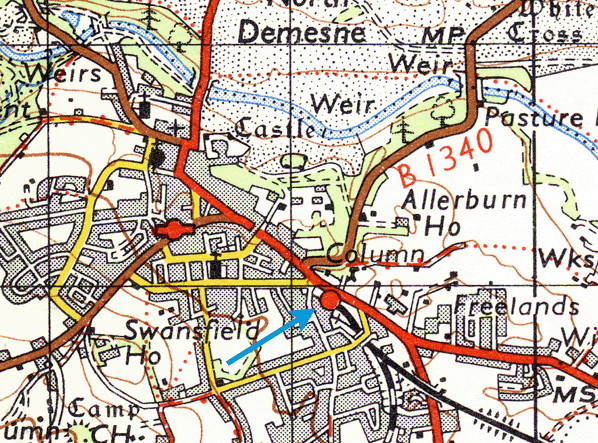
old15.jpg)
8.jpg)




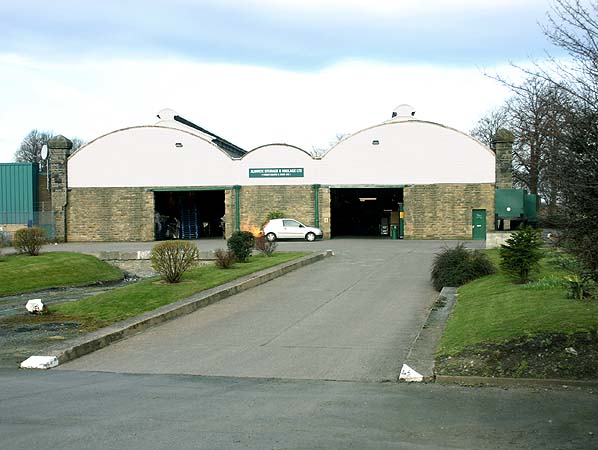

 Home Page
Home Page